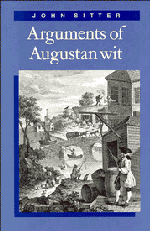Book contents
1 - The character progress as an Augustan phenomenon
Published online by Cambridge University Press: 28 January 2010
Summary
In spite of substantial and at some levels decisive continuities in grammar and vocabulary, no generation speaks quite the same language as its predecessors … What really changes is something quite general, over a wide range, and the description that often fits the change best is the literary term “style” … For what we are defining is a particular quality of social experience and relationship, historically distinct from other particular qualities, which gives the sense of a generation or of a Period.
Raymond Williams, on “structures of feeling”If a significant structure of feeling connects English Augustan authors, the best evidence of it should perhaps rest less in shared thematic preoccupations than in common stylistic and formal expressions of a mode of perception and analysis. Looking for a period style, in other words, an observer may hope to fasten on features not primarily decorative and to find a style of experiential construction as well as reconstruction, a style of knowing as well as a manner of speaking. One way of beginning is to study a mode of presenting character that seems peculiar to the period from roughly the 1670s to the 1740s, a kind of character sketch I will call the character progress. The most immediately memorable examples are Hogarth's Harlot's Progress and Rake's Progress and the brilliant series Marriage à la Mode. Literary counterparts to (and possible influences on) these visual progresses are brief narratives, generally in poetic satire where they range from about twenty to over a hundred lines, that portray a character by giving his or her ill-fated career, a career that may run from birth or early adulthood to death, disaster, or an ironic success.
- Type
- Chapter
- Information
- Arguments of Augustan Wit , pp. 6 - 48Publisher: Cambridge University PressPrint publication year: 1991

